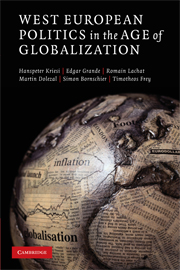Book contents
- Frontmatter
- Contents
- List of figures
- List of tables
- Preface and acknowledgments
- Part I Theory and methods
- 1 Globalization and its impact on national spaces of competition
- 2 Contexts of party mobilization
- 3 The design of the study: the distinguishing characteristics of our approach
- Part II Country studies
- Part III Comparative analyses
- Appendix A Technical appendix
- Appendix B Detailed statistical results
- References
- Index
1 - Globalization and its impact on national spaces of competition
Published online by Cambridge University Press: 05 September 2012
- Frontmatter
- Contents
- List of figures
- List of tables
- Preface and acknowledgments
- Part I Theory and methods
- 1 Globalization and its impact on national spaces of competition
- 2 Contexts of party mobilization
- 3 The design of the study: the distinguishing characteristics of our approach
- Part II Country studies
- Part III Comparative analyses
- Appendix A Technical appendix
- Appendix B Detailed statistical results
- References
- Index
Summary
The political consequences of globalization are manifold. On the one hand, the processes covered by this term lead to the establishment of new forms of political authority and of new channels of political representation at the supranational level and open up new opportunities for transnational, international and supranational mobilization (Della Porta et al. 1999). On the other hand, the same processes have profound political implications at the national level. National politics are challenged both ‘from above’ – through new forms of international cooperation and a process of supranational integration – and ‘from below’, at the regional and local level. While the political consequences of globalization have most often been studied at the supra- or transnational level (Zürn 1998; Held et al. 1999; Greven and Pauly 2000; Hall and Biersteker 2002; Grande and Pauly 2005), we shall focus on the effects of globalization on national politics. We assume that, paradoxically, the political reactions to economic and cultural globalization are bound to manifest themselves above all at the national level: given that the democratic political inclusion of citizens is still mainly a national affair, nation-states still constitute the major arenas for political mobilization (Zürn et al. 2000). Our study focuses on Western European countries, where globalization means, first of all, European integration. For the present argument, however, this aspect of the European context is not essential. Europeanization and European integration can also be seen as special cases of the more general phenomenon of globalization (Schmidt 2003).
- Type
- Chapter
- Information
- West European Politics in the Age of Globalization , pp. 3 - 22Publisher: Cambridge University PressPrint publication year: 2008
- 25
- Cited by



